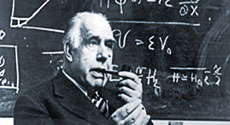Niels Bohr Lecture by Jacob Friis Sherson
Using online computer games for quantum optimization tasks
In the emerging field of citizen science ordinary citizens have already contributed to research in as diverse fields as astronomy, protein and RNA folding, and neuron mapping by playing online games.

In the www.scienceathome.org project, we have extended this democratized research to the realm of quantum physics by gamifying a class of challenges related to optimization of gate operations in a quantum computer. The games have been played 500,000 times and perhaps surprisingly we observe that a large fraction of the players outperform state-of-the-art optimization algorithms [1]. Moreover, clustering analyses of player solutions have revealed the existence of distinct strategies with a clear physical interpretation. Combining the player intuition with optimization algorithms led to an even more powerful algorithm.
We are currently developing additional games with researchers from cognitive science, behavioral economics, and collaborative problem solving to shed additional light on the process of human intuition and innovation. Finally, we are working on the democratic lab: an easily accessible remote interface for our ultra-cold atoms experiment allowing amateur scientists, students, and research institutions world-wide to experiment with state-of-the-art quantum simulation.
[1] Sørensen et al, accepted for Nature, arXiv:1506.09091
- Wednesday, March 2, 2016 at 15:15 in Aud. 3 at HCØ.
About Jacob Friis Sherson:
Assoc. Prof. Jacob Sherson is an experimental physicist at Aarhus University specializing in quantum technology using ultra-cold atoms and non-destructive measurement.
He is also director of the interdisciplinary AU Ideas Center for Community Driven Research bringing together researcher in physics, chemistry, didactic and cognitive science, psychology, economy, and business administration.
|
Coffee and Cookies
|

 Niels Bohr Lectures
Niels Bohr Lectures 